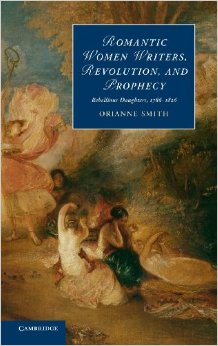 Orianne Smith, associate professor and chair of English, has won the prestigious biennial First Book Prize from the British Association of Romantic Studies (BARS). Smith’s book Romantic Women Writers, Revolution, and Prophecy: Rebellious Daughters, 1786–1826 (Cambridge University Press, 2013) was selected from a strong shortlist of finalists for the inaugural prize.
Orianne Smith, associate professor and chair of English, has won the prestigious biennial First Book Prize from the British Association of Romantic Studies (BARS). Smith’s book Romantic Women Writers, Revolution, and Prophecy: Rebellious Daughters, 1786–1826 (Cambridge University Press, 2013) was selected from a strong shortlist of finalists for the inaugural prize.
Professor Smith traveled to Cardiff, Wales to accept the award. In an announcement posted on the BARS blog, the judges stated during the award ceremony that her book “corrects the gender imbalance of previous work on literary enthusiasm by shedding light on the previously obscured role of women writers in apocalyptic discourse…a tremendously fluent and incisive study, making surprising and productive use of speech-act theory to bring out the performative dimension of prophetic writing.”
Dr. Smith participated in a detailed and wide-ranging Q&A posted on the BARS blog about her research process in writing her award-winning book. She said the idea for the project first came to her when writing the conclusion for her final paper on the “wild, wacky and truly wonderful Civil War prophetesses” in her seventeenth-century sectarian writers class during her second year of graduate school.

“It occurred to me that there could be an interesting connection between these seventeenth-century women who claimed the authority of God during a period of revolution and Romantic women writers who also assumed the mantle of the female prophet in the wake of the French Revolution,” she said. “I wrapped up the paper with this thought, but the idea of a British tradition of female prophecy stuck with me.”
Also in the Q&A, Smith discussed how the project evolved, the benefit of placing religious discourses at center of cultural debates and literary studies, and her future research, among other topics.
Dr. Smith’s teaching and research interests include gender and Romanticism, the Gothic, and the connections between religion, superstition, and magic in the eighteenth and nineteenth centuries and she has published widely in these fields. Read more about her work on the English department website.
